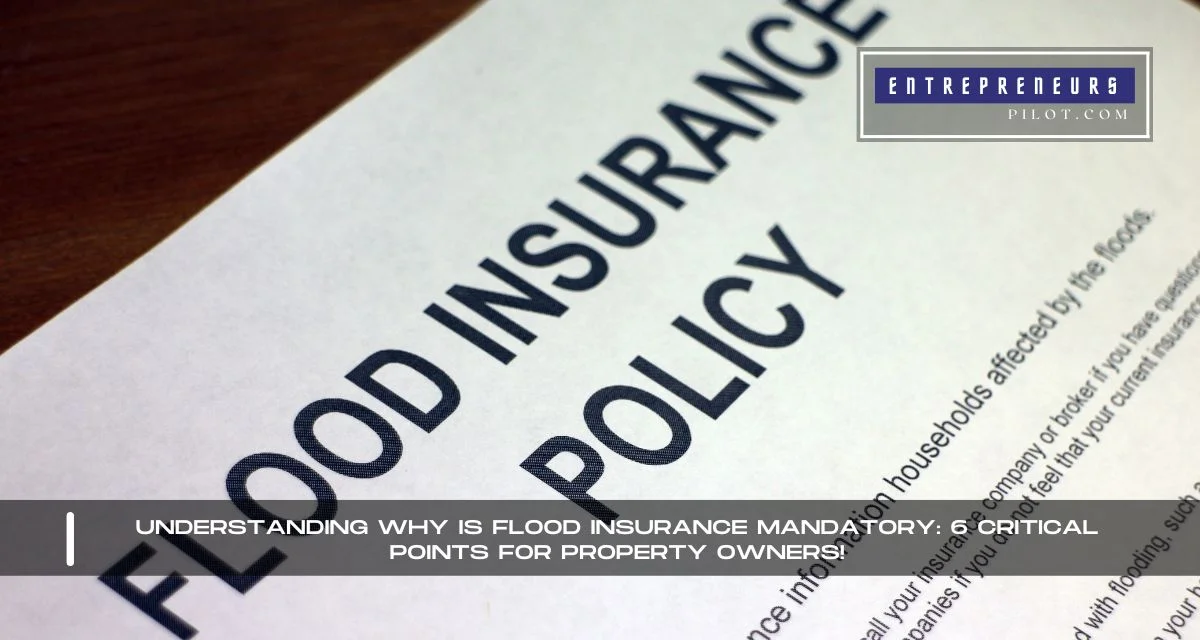Introduction
Ever wonder why Is Flood Insurance Mandatory for so many property owners across the United States? With changing climates and unexpected natural disasters, flood insurance has become a crucial part of safeguarding your property’s future. This isn’t just about following rules; it’s about understanding the critical reasons behind the mandate and how it protects your most valuable asset—your home or business. In this comprehensive guide, we’ll dive into six essential points every property owner must know about the necessity of flood insurance. Whether you’re nestled in a high-risk zone or simply want to ensure your property’s safety against unforeseen floods, this article is your starting point to grasp why flood insurance isn’t just mandatory but fundamentally important.
Table of Contents
The Foundation of Flood Insurance Necessity
1. High-Risk Zones and FEMA’s Role
The Federal Emergency Management Agency (FEMA) plays a pivotal role in identifying flood-prone areas, designated as high-risk zones. Properties within these zones face a significant risk of flooding, leading to the mandate of flood insurance as a protective measure. This requirement isn’t arbitrary but based on detailed environmental studies and historical data, ensuring that homeowners and businesses are prepared for the worst.
2. Protecting Your Investment
One of the most compelling reasons flood insurance is mandatory is the sheer level of protection it offers to your investment. Floods can cause catastrophic damage, often exceeding the cost of other natural disasters. Regular homeowners’ insurance policies typically exclude flood damage, making specific flood insurance a critical safeguard for your property’s value and your financial stability.
- For Expert Financial Insights And Guidance, You Can Visit Our Sister Site – ArabsGeek.com Now!
- Curiosity Piqued? Dive Into the Most Captivating Financial Content by Visiting Our Homepage!
- Unlock Exclusive Business Opportunities! 🚀 Connect with Us Now at our Email: [email protected]!
3. Mortgage Requirements
Lenders play a significant role in the mandate of flood insurance. If your property is in a high-risk flood zone and you have a mortgage from a federally regulated or insured lender, flood insurance is a non-negotiable requirement. This protects both the lender’s and the homeowner’s interests, ensuring that the property remains a viable asset and the loan a secure investment.
4. Community Resilience
On a broader scale, mandatory flood insurance contributes to community resilience. By ensuring that all properties at risk are covered, the aftermath of a flood can be managed more effectively, reducing the long-term economic impact on the community. It’s about collective safety and recovery, helping neighborhoods bounce back faster after a disaster.
5. Climate Change and Rising Flood Risks
As climate change intensifies, the risk of flooding increases even in areas previously considered low-risk. Making flood insurance mandatory for more properties is a proactive approach to this evolving threat. It acknowledges the shifting patterns of natural disasters and places a safety net under more homes and businesses against future floods.
6. Financial Security for All
Ultimately, the mandate of flood insurance is about ensuring financial security for homeowners, businesses, and lenders. It’s a critical component of risk management, providing peace of mind that in the event of a flood, the financial implications will be manageable. This insurance doesn’t just protect physical properties; it safeguards livelihoods and the continuity of businesses.
Conclusion | Is Flood Insurance Mandatory
Understanding why flood insurance is mandatory illuminates the broader picture of property protection in the face of natural disasters. It’s not merely a regulatory hoop to jump through but a foundational element of responsible property ownership and community membership. As we navigate an era of increasing environmental uncertainties, flood insurance stands as a beacon of preparedness, ensuring that when the waters rise, our most cherished assets remain secure. Embracing this mandate is a step toward resilience, safeguarding not just our properties but our future.
Frequently Asked Questions
1. Is flood insurance required if my property is not in a high-risk zone?
While it’s not federally required for properties outside high-risk zones, it’s highly recommended. Flooding can occur in moderate- to low-risk areas due to various factors, and being prepared is always wise.
2. How can I find out if my property is in a high-risk flood zone?
You can check FEMA’s Flood Map Service Center or consult with your local government’s planning department to determine if your property is in a designated high-risk zone.
3. Can I buy flood insurance if it’s not mandated for my property?
Absolutely. Flood insurance is available for purchase for any property, regardless of its flood zone designation. This proactive approach is advisable for comprehensive protection.
4. How much does flood insurance cost?
The cost of flood insurance varies widely depending on your property’s location, size, construction, and your chosen coverage level. Properties in high-risk zones typically face higher premiums.
5. What does flood insurance typically cover?
Flood insurance covers direct physical losses caused by flooding and losses resulting from flood-related erosion caused by heavy or prolonged rain, coastal storm surge, melting snow, blocked storm drainage systems, or levee dam failure.











